| Srl | Item |
| 1 |
ID:
119085
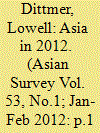

|
|
|
|
|
| Publication |
2013.
|
| Summary/Abstract |
PERHAPS ONLY A TRUE BELIEVER in the alleged Mayan forecast of an end of
the world on December 21 could be truly enthusiastic about the past year.
Estimated economic (gross domestic product, or GDP) growth in Asia
dropped beginning in late 2011and continuing into 2012; the World Bank's
latest estimate forecast 7.2% for developing East Asia, the lowest rate for the
region since the 1997-98 Asian Financial Crisis. The economies of Central
and South Asia grew even more slowly. Politically the region was on tenterhooks as con?icting territorial claims, staunchly upheld by their respective
advocates since (at least) 2009, unleashed nationalist riots and escalating
bilateral brinkmanship. Meanwhile, the region's high-tech arms race against
unnamed threats continued, headlined by China's launch of its ?rst aircraft
carrier, the Liaoning(nee´ Varyag), and by North Korea's successful launch of
a satellite into polar orbit-although the so-called weather satellite apparently
failed to function, the obvious point was not weather but to demonstrate
Pyongyang's ability to hit North America with a nuclear payload. Pakistan,
albeit deeply immersed in Afghanistan's 10-year war on terror (reportedly on
both sides), is busy constructing a full-?edged nuclear deterrent-despite
a third year of devastating ?oods.
|
|
|
|
|
|
|
|
|
|
|
|
|
|
|
|
| 2 |
ID:
091978
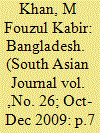

|
|
|
|
|
| Publication |
2009.
|
| Summary/Abstract |
The global recession could not have come at a less inopportune time for Bangladesh.The economy suffered shocks on both domestic and foreign fronts in FY08'. Domestically Bangladesh experienced two rounds of floods and was hit by the catastrophic major cyclone Sidr' which resulted in a huge loss of life and destruction of infrastructure, property and crops.
|
|
|
|
|
|
|
|
|
|
|
|
|
|
|
|
| 3 |
ID:
096166
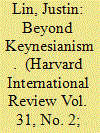

|
|
|
| 4 |
ID:
129209
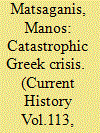

|
|
|
|
|
| Publication |
2014.
|
| Summary/Abstract |
Greece holds the rotating presidency of the European Union for the first half of 2014. As some commentators in Germany and elsewhere have been quick to note, there is surely something incongruous, if not outright absurd, in the spectacle of the most wayward member of Europe's family of nations setting the agenda (or pretending to), even for such a short time. For Greece is still in the throes of a terrible crisis. The experience of economic failure, nearbankruptcy, deep and protracted recession, a sudden fall in living standards, and bitter political conflict has dangerously raised the temperature of public debate. As if to prove the critics right, the Greek presidency got off to an inauspicious start, marked by a series of events ranging from the grotesque to the tragic. Former Transport Minister Michalis Liapis was caught driving without a licence and with counterfeit registration plates by traffic police too young to recognize him. It then transpired that his family home had been refurbished courtesy of Europe's taxpayers: EU "structural funds" earmarked for upgrading tourism infrastructure were diverted for his private use. Since the faction Liapis belonged to in the ruling conservative party was no longer influential, the prime minister's office declined to lift a finger to stop the wheels of justice, opting instead for a show of respect for judicial independence and the rule of law
|
|
|
|
|
|
|
|
|
|
|
|
|
|
|
|
| 5 |
ID:
085956


|
|
|
|
|
| Publication |
2009.
|
| Summary/Abstract |
The Awami League swept back to power in Bangladesh's first elections since a state of emergency was imposed in 2007. India accused Pakistan of aiding the Islamist terrorists who carried out the Mumbai attacks. South Africa's ruling African National Congress (ANC) split and corruption charges were revived against the ANC leader and putative next president, Jacob Zuma. Sri Lanka's army seized the Tamil Tigers' de facto capital and the country's leading journalist was assassinated. International euphoria over the election of Barack Obama as US president was tempered by the unfolding global recession; the US led the way, with 530,000 jobs lost in November.
|
|
|
|
|
|
|
|
|
|
|
|
|
|
|
|
| 6 |
ID:
173745


|
|
|
|
|
| Summary/Abstract |
The COVID‐19 pandemic broke out at a time when there were heightened uncertainties in the global economy. Understanding these uncertainties provides an important background for analyzing the impact of the pandemic on the global economy, assessing the effectiveness of policy measures in combating the pandemic and reviving the global economy, and predicting the trajectory of the economic recovery in the post‐pandemic era. We analyze how COVID‐19 would likely deepen an existing malaise in the global economy, and what could be done to address these problems while managing the economic recovery. We argue that three fundamental factors that could lead to a solid recovery in the post pandemic era are structural reform, new technology and re‐integration. They could be managed by instituting a new “global social contract.” Supported by strong public policies at all levels, especially at national level, these three factors could bring about the salvation of the global economy as it recovers or re‐emerges from the pandemic crisis.
|
|
|
|
|
|
|
|
|
|
|
|
|
|
|
|
| 7 |
ID:
175001
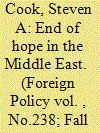

|
|
|
| 8 |
ID:
107535


|
|
|
|
|
| Publication |
2011.
|
| Summary/Abstract |
Why are citizens in advanced industrialized countries willing to accept high prices for agricultural products? Conventional wisdom suggests that agricultural interests secure government protection because producers are concentrated and better politically organized than diffused consumers. Due to its focus on producer capacity for collective action, however, the literature fails to account for the high levels of mass support for agricultural protectionism in advanced industrialized nations. This article presents new evidence from a survey experiment in Japan conducted during the recent global recession (December 2008) that accounts for this puzzle. Using randomly assigned visual stimuli, the experiment activates respondents' identification with either producer or consumer interests and proceeds to ask attitudinal questions regarding food imports. The results suggest that consumer priming has no reductive or additive effects on the respondents' support for liberalizing food imports. Surprisingly, producer priming increases respondents' opposition to food import, particularly among those who fear future job insecurity. We further disentangle the puzzling finding that consumers think like producers on the issue of food import along two mechanisms: "sympathy" for farmers and "projection" of their own job insecurity. The results lend strong support to the projection hypothesis.
|
|
|
|
|
|
|
|
|
|
|
|
|
|
|
|
| 9 |
ID:
100801
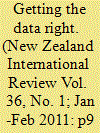

|
|
|
| 10 |
ID:
091980
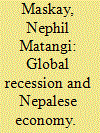

|
|
|
|
|
| Publication |
2009.
|
| Summary/Abstract |
The cause of the ongoing recession is well documented. For example, Lahan (2007) states that the immediate cause or trigger of the crisis was the bursting of the housing bubble in the United States which had peaked in 2005-06.The high default rates on subprime and adjustable rate mortgages began to increase quicklly thereafter.
|
|
|
|
|
|
|
|
|
|
|
|
|
|
|
|
| 11 |
ID:
093368
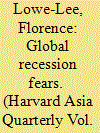

|
|
|
| 12 |
ID:
098774


|
|
|
| 13 |
ID:
112098


|
|
|
|
|
| Publication |
2012.
|
| Summary/Abstract |
Amid the gloomy context of the global recession, there is a ray of light: a massive wave of urbanization propelling growth throughout the developing world. By 2025, many of the six hundred cities expected to generate 60 percent of global GDP growth will be in the South and especially the East. The group will not just contain well-known megacities but a new breed of dynamic "middleweights"-midsized cities that are among the most powerful forces for global growth today. The rise of emerging-market cities is significant because these urban centers are proving to be the world's economic dynamos, attracting workers and productive businesses. This article explores the rise of both middleweight cities and megacities in the developing world. Drawing lessons from cities that have successfully blazed the trail to urbanization, the authors will demonstrate how local governments can impact the scale and speed of economic development in their regions and how private investment in buildings and infrastructure today will shape the global economy in future decades.
|
|
|
|
|
|
|
|
|
|
|
|
|
|
|
|
| 14 |
ID:
133434
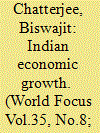

|
|
|
|
|
| Publication |
2014.
|
| Summary/Abstract |
The growth performance of the Indian economy has been varied, yet impressive. From a slow growing nation in the 1950s and 1960s, India moved to a high growth trajectory since the initiation of economic reforms since 1991, and despite serious downturn in recent years due to the onset of global recession, in term of growth of GDP at factor cost, India in recent periods became the second fastest growing nation in the world, and this continued systematically over a decade. Her growth performance in recent decades like that of China has been hailed as the success story of globalization
|
|
|
|
|
|
|
|
|
|
|
|
|
|
|
|
| 15 |
ID:
091776
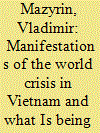

|
|
|
|
|
| Publication |
2009.
|
| Summary/Abstract |
The global recession has had its effect on Vietnam because it came at a time when the country was going through an internal cyclic crisis and reeling from the consequences of errors the country's government had made in its economic policy. The program developed to find a way out of the crisis stimulates consumer and investment demand, and contains monetary and budgetary financial measures. The demand stimulation plan is based on the effective demand theory and calculation of the maximum multiplier effect. These measures help ease stagnation, but may increase systemic risks in the local economy. On the upside, Vietnam's efforts to ride out the crisis reveal a great potential of the egalitarian form of capitalism in countries still in transition.
|
|
|
|
|
|
|
|
|
|
|
|
|
|
|
|
| 16 |
ID:
123258
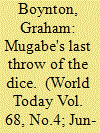

|
|
|
| 17 |
ID:
112360
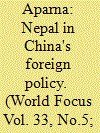

|
|
|
| 18 |
ID:
101209


|
|
|
|
|
| Publication |
2011.
|
| Summary/Abstract |
The pattern of Asian geopolitics can be examined by employing three analytical perspectives. The first employs East Asia and the vigorous debate over the meaning of the rise of China as an intellectual prism to observe the currents of geopolitical continuity and change that are currently abroad in the Asian region. The second explores the extent to which the interacting forces of geopolitics and military modernization foster the rise of new force projection capabilities that may affect the strategic environment in Asia-particularly in East Asia. Here, the focus is mainly on the arsenals of the three indigenous Asian giants, China, Japan and India, all of whom have developed, or are in the process of developing, significant air and maritime assets whose operations have the potential to intersect in East and South East Asia. Russia is not as much a presence because it no longer possesses its powerful Soviet-era Pacific Fleet and has, in essential respects, retreated to its traditional role as a Eurasian land power.1 The third examines the future of Sino-American relations in Asia in the context of the debate over China's ascent and U. S. decline-a discussion that has intensified since the implosion of the U.S. financial system in 2008 and the onset of the worst global recession since the 1930s.
|
|
|
|
|
|
|
|
|
|
|
|
|
|
|
|
| 19 |
ID:
095734
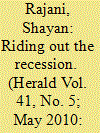

|
|
|
| 20 |
ID:
110945
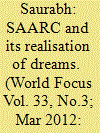

|
|
|